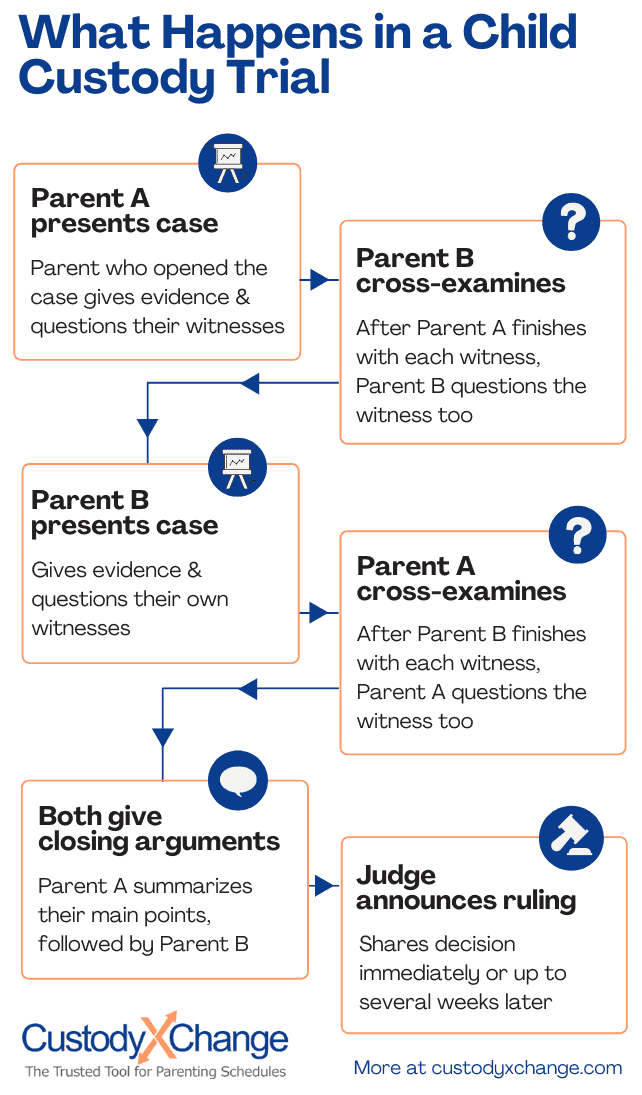New Jersey Child Custody Trials: What to Expect
If you aren't able to settle your custody or divorce case, you'll have a trial.
During the trial, you and the other parent present arguments and evidence to the judge so they can issue a final custody order.
Many cases involve matters besides custody. The court can hear everything at one trial, or parents can agree to address issues separately. The following describes a custody-only trial.
Note that some trial procedures vary by case, county and judge.
Preparing for trial
Preparing is key to presenting a convincing argument in court. The process can take months.
If you have an attorney, they'll arrange evidence and get you and your witnesses ready to take the stand.
If you don't have an attorney, there are resources you can turn to as you do these tasks yourself.
In either situation, avoid behaviors that can hurt your case like bad-mouthing the other parent on social media or coaching your child to say things against them.
The judge may ask you to prepare a statement for the pre-trial conference that lists evidence and explains your position.
Evidence must follow New Jersey's Rules of Evidence and could include:
- A proposed parenting plan
- Police reports and criminal records
- Reports from expert assessments
- Entries from a parenting journal
- Relevant photos and videos
- Witness testimony
Witnesses generally include the parents themselves and people who know the family casually or professionally. If your case involved a guardian ad litem, you can call them as a witness. If there was an expert assessment, you can call the psychologist to testify too.
Write down questions to ask your witnesses as well as the other parent and their witnesses when they take the stand. Focus on what can strengthen your arguments. Meet with your witnesses before trial so they understand the information you need from them.
Scheduling and timing
Most trials begin less than six months after discovery ends. When there's domestic violence, the court aims to start within 10 days of the case opening, but it typically delays to allow parents time to hire lawyers and build their cases.
The average trial has two or three days of testimony, each lasting three hours. Trial dates are typically nonconsecutive and can happen weeks or months apart, depending on the court calendar.
People at a trial
Parents, with their lawyers, sit at separate tables across from the judge's bench. Others in attendance include a bailiff, court reporter, court clerk and, if applicable, guardian ad litem and translator.
Witnesses are not allowed to sit in. Besides that, you can invite any adult to sit in the gallery. Children aren't allowed in the courtroom, so find a child care center beforehand.
Procedures
In a trial, lawyers make opening and closing statements, talk to the judge, question witnesses and present evidence. Parents without lawyers must carry out these duties themselves.
The parent who opened the case, called the plaintiff, has the floor first. They begin with an opening statement, which summarizes their position and the evidence they'll present to support it.
Anyone who testifies must take an oath to tell the truth before they take the stand.
The plaintiff generally does this first to answer questions from their attorney. (If self-represented, they can give their testimony as a statement — essentially a short speech).
They may also choose not to testify and instead go straight to calling witnesses in a process called direct examination. They can present evidence to support their claims at the same time.
While the plaintiff's witnesses are on the stand, the defendant has the opportunity to question them in what's called cross-examination. The defendant tries to gain information that helps their case or pokes holes in the plaintiff's arguments.
Some judges allow redirect examination. This lets the plaintiff question their witnesses again to clarify claims challenged during cross-examination.
After the plaintiff rests their case, the defendant has the floor. They repeat the same process as above, beginning with an opening statement.

Finally, each party makes a closing argument to restate the main points of their case. At this point, they cannot introduce new evidence or vouch for the credibility of a witness.
The judge usually takes a few days to deliberate. In the interim, parents follow any temporary orders or agreements in place. The judge may interview the child privately on a nontrial day before issuing a decision.
Parents receive a copy of the final order via mail or email.
If believe a legal error was made, you have 45 days to file an appeal.
Tips
- Wear business casual dress (no t-shirts, sandals, flip flops or ripped clothing).
- Arrive early to allow yourself time to check in and find the courtroom.
- Treat everyone, including court employees and the other party, with respect.
- Only speak when asked to.
- Speak clearly, and don't rush.
- Don't start arguments with the other party; the court is not the place to vent frustrations.
- Don't let personal issues with the other parent interfere with what's best for your child.
- Avoid getting overly emotional, especially when the judge announces their decision.
Staying organized
Going to trial over child custody requires serious organization.
You'll need to present evidence, which could range from messages with the other parent to a calendar showing when you care for your child. You should also present a proposed parenting plan and schedule to the court.
The Custody X Change app lets you create and manage all of these elements in one place.

You can customize this to fit your situation with Custody X Change.
With parent-to-parent messaging, personalized custody calendars, a parenting plan template and more, Custody X Change makes sure you're prepared not only for trial but for every step of your case.
Take advantage of our technology to get what's best for your child.
